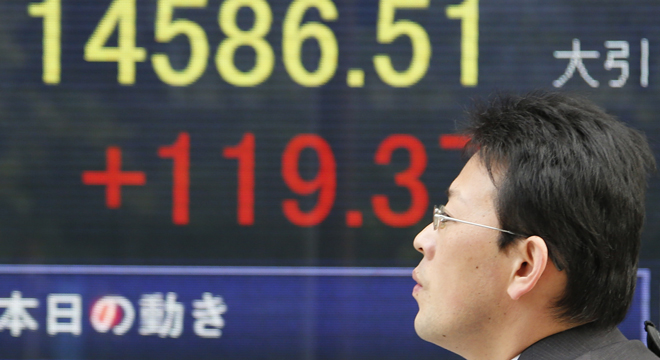HONG KONG (AP) — World stock markets bounced back Friday as upbeat U.S. economic data helped shake off worries about future increases in U.S. interest rates.
Trading in Asia was subdued as Japanese markets were closed for a public holiday.
The Conference Board index of leading indicators, a measure of U.S. economic health, rose in February by the largest amount in three months, suggesting growth should bounce back following a harsh winter. Separately, U.S. jobless benefits rose to near pre-recession levels, suggesting stable job market in the world’s largest economy.
The numbers helped to perk up stocks after Federal Reserve chief Janet Yellen unsettled investors by suggesting earlier this week that U.S. interest rates could rise sooner than markets were anticipating. Investors will be looking for further clues on Fed policy when four of the central bank’s officials make separate speeches later Friday.
“Overall, we can probably expect a somewhat more nuanced version of the pretty blunt message given by Yellen earlier in the week,” said Michael Every, head of Asian financial market research at Rabobank.
In early European trading, France’s CAC 40 rose 0.2 percent to 4,338.14 and Germany’s DAX climbed 0.3 percent to 9,321.87. Britain’s FTSE 100 rose 0.3 percent to 6,560.64.
US stocks were poised to rise. Dow futures were up 0.2 percent to 16,300 and broader S&P 500 futures were up 0.2 percent to 1,870.20.
Asian markets ended higher. South Korea’s Kospi rose 0.8 percent to close at 1,934.94 and Hong Kong’s Hang Seng gained 1.2 percent to finish at 21,436.70. Australia’s S&P/ASX 200 rose 0.8 percent to 5,338.10.
In mainland China, the Shanghai Composite Index advanced 2.7 percent to 2,047.62 as the yuan remained weak. China’s currency was trading at 6.2245, the lowest in about 13 months.
A recent loosening of exchange rate controls has helped speed the currency’s decline, which could give a boost to the export-reliant economy. Analysts believe authorities are trying to clamp down on frothy credit growth and discourage speculators as for the past several years the yuan has slowly appreciated in value.
But Rabobank’s Every said the weakening yuan also shows that people are scrambling to get their money out of China and the outgoing tide could roil the Chinese financial system.
“It’s like playing Jenga with the markets. They’ve only pulled out one block. Will the rest come down by themselves?” he said.
In currencies, the euro dipped slightly to $1.3778 from $1.3779 in late trading Thursday. The dollar dipped to 102.14 Japanese yen from 102.39.
Oil prices fell. Benchmark crude oil for May delivery was down 25 cents to $98.65 in electronic trading on the New York Mercantile Exchange. The contract fell 27 cents to settle at $98.90 on Thursday.






